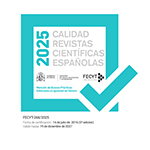The mouthy maid. Domestic service workers in the Civil War and the post-war period
Abstract
The aim of this paper is to show how the changes that took place in the Second Republic regarding the domestic service marked the use that Francoism was going to make of it as a platform for the re-education of the popular classes. In order to do so, I will mainly use archival and newspaper sources and the interpretative framework of studies on the social attitudes of Franco’s regime. The diversification of women’s models in the Republic affected domestic service workers who, among other aspects, were able to join trade unions for the first time in Spanish history and their work, albeit timidly, was regulated. Likewise, during the Civil War, the figures of the maids as informers and militiawomen appeared and left a great mark on society. So much so that the Republic came to be represented as a servant girl who rebelled against her masters. In conclusion, I argue that because of this national image, of domestic service as a metaphor for change and disorder, the dictatorship wanted to eliminate any relationship between domestic service and the labour sphere and used it as a platform for the framing and re-education of the daughters of the «other Spain». A Spain that was inconceivable without faithful servants.
Downloads
Article download
License
Aquellos autores/as que tengan publicaciones con esta revista, aceptan los términos siguientes:
a. Los autores/as conservarán sus derechos de autor y garantizarán a la revista el derecho de primera publicación de su obra, el cuál estará simultáneamente sujeto a la Licencia de reconocimiento de Creative Commons Reconocimiento-No comercial-Sin obra derivada 4.0 España que permite a terceros compartir la obra siempre que se indique su autor y su primera publicación esta revista.
b. Los autores/as podrán adoptar otros acuerdos de licencia no exclusiva de distribución de la versión de la obra publicada (p. ej.: depositarla en un archivo telemático institucional o publicarla en un volumen monográfico) siempre que se indique la publicación inicial en esta revista.
Plagio y fraude científico
La publicación de un trabajo que atente contra los derechos de propiedad intelectual será responsabilidad de los autores/as, que serán los que asuman los conflictos que pudieran tener lugar por razones de derechos de autor. Los conflictos más importantes pueden darse por la comisión de plagios y fraudes científicos.
Se entiende por plagio:
1.Presentar el trabajo ajeno como propio.
2.Adoptar palabras o ideas de otros autores sin el debido reconocimiento.
3.No emplear las comillas u otro formato distintivo en una cita literal.
4.Dar información incorrecta sobre la verdadera fuente de una cita.
5.El parafraseo de una fuente sin mencionar la fuente.
6.El parafraseo abusivo, incluso si se menciona la fuente.
Las prácticas constitutivas de fraude científico son las siguientes:
1.Fabricación, falsificación u omisión de datos y plagio.
2.Publicación duplicada.
3.Conflictos de autoría.












